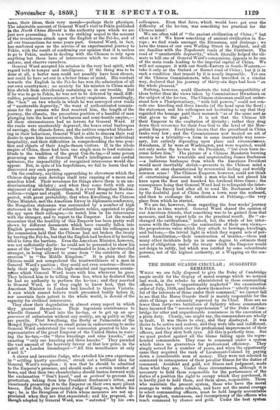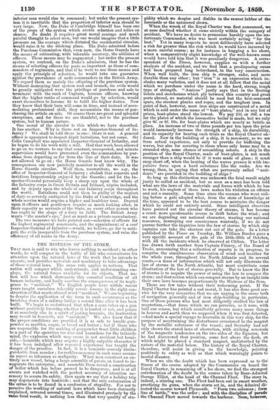THE HORSE GUARDS CIRCULAR ; SUGGESTED REMEDIES.
WHILE we are fully disposed to give the Duke of Cambridge ample credit for the display of moral courage which we noticed last week, in the rebuke he administered to those commanding officers who have " unpardonably neglected" the examination order of July, 1858, and have shown themselves " utterly unmind- ful of the interests of those under their command," we cannot fail to see that the Horse Guards itself is mainly responsible for the state of things so solemnly reproved by its Chief. Here are no fewer than forty-two battalions of Infantry whose commanders have incurred the " severest reprehension" of the Duke of Cam- bridge for utter and unpardonable remissness in the execution of a plain duty. Clearly, one might say, the commanders are wholly in fault. It was theirs to obey, and they disobeyed. It was theirs to be active and zealous, and they were idle and indifferent. It was theirs to watch over the professional improvement of their officers, and they shut both eyes. All this is perfectly true. But we must protest against all the blame falling upon the repre- hended commanders. They rose to command under a system which takes no guarantees for professional efficiency. They simply served for a number of years and when the opportunity came they acquired the rank of Lieutenant-Colonel by paying down a considerable sum of money. They were not selected to command in consequence of their peculiar fitness for the duties of command. Accident and gold, not fitness and judgment, made them what they are. Under these circumstances, although it is necessary to hold them responsible for the performance of the duties of a position the right to occupy which they purchased, it is hardly just to hold them, and them alone, responsible. Those who maintain the present system, those who have the moral courage to write stern rebukes, and have not the moral co to select commanding officers, must be held largely account= for the neglect, remissness, and incompetency of the officers who reach command by chance and gold. Under the best system inferior men would rise to command; but under the present sys- tem it is inevitable that the proportion of inferior men should be very large. Now, the Duke of Cambridge himself has been one of the props of the system which avoids selection and relies on chance. No doubt it requires great moral courage and much painful thought to select men, but one would imagine that a little pressure on the courage which dictated the confidential circular, would raise it to the sticking place. The Duke admitted before the Purchase Commission that, even now, the Horse Guards have the means of estimating, with tolerable accuracy, the abilities of officers. Those means may be augmented ; but under the present system, we contend, on the Duke's admission, that he has the means of selecting officers for posts so important as those of com- manders of regiments, and that if he were to use those means and apply the principle of selection, he would take one guarantee against the prevalence of unfit commanders in the British Army. We regard them as mainly the offspring of the purchase system. Without destroying that system root and branch, its evils would be greatly mitigated were the privilege of purohase and sale to terminate with the rank of Captain, because officers, knowing that the higher ranks of command would go by selection, would exert themselves to become fit to fulfil the higher duties. Now they know that their turn will come in time, and instead of accu- mulating professional skill, they accumulate the means of pur- chasing the article on sale. Of course there are great and splendid exceptions, and for these we are thankful, not to the purchase system, but to human nature. One moral of the circular is this which we have described. It has another. Why is there not an Inspector-General of In- fantry ? We shall be told there is one : there is not. A general officer is appointed to inspect depot battalions, but not corps. Sir Colin Campbell was appointed Inspector-General of Infantry, and he began to do his work with a will. Had that work been allowed to go on we venture to say that constant, unexpected, and minute supervision would have prevented even the commanders by pur- chase from departing so far from the line of their duty. It was not allowed to go on ; the Horse Guards best know why. The consequences are now painfully manifest to all the world in the Horse Guards circular. Well then, reconstitute, we say, the office of Inspector-General of Infantry ; abolish that separate and invidious Inspectorship enjoyed by the Guards ; and let the In- spector-General personally keep a sharp eye upon the whole of the Infantry corps in Great Britain and Ireland, ciepOts included, and by deputy upon the whole of our infantry corps throughout the world. Battalions could not then be guilty of the neglect of duty so severely castigated by the Duke of Cambridge, and the whole service would acquire a higher and healthier tone. Depend upon it officers and gentlemen require as much looking after, in their capacity as servants of the State, as every other person who has aught in the shape of a duty to fulfil. The British Army wants "the master's eye," just as much as a private manufactory.
The two measures we have pointed out—selection of officers for the highest regimental commands, and the appointment of a real Inspector-General of Infantry—would, we believe, go far to miti- gate the evils inseparable from the purchase system, and raise the efficiency of all ranks in the Army.



























 Previous page
Previous page